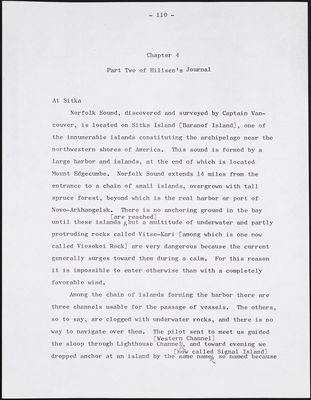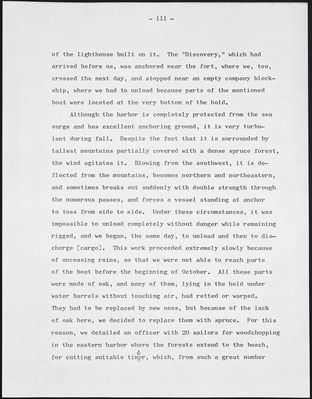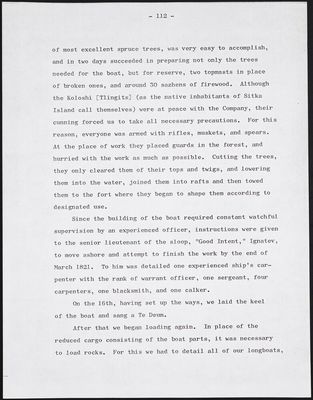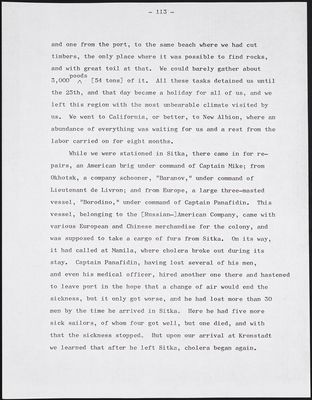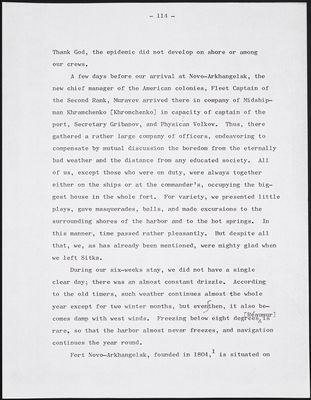Pages
mss142-vasilevShishmarev-i4-001
- 110 -
Chapter 4 Part Two of Hillsen's Journal
At Sitka Norfolk Sound, discoverd and surveyed by Captain Vancouver, is located in Sitka Island (Baranof Island), one of the innumberable islands consituting the archipelago near the northwestern shores of America. This sound is formed by a large harbor and islands, at the end of which is located Mount Edgecumbe. Norfolk Sound extends 14 miles from the entrance to a chain of small islands, overgrown with tall spruce forest, beyond which is the real harbor or port of Novo-Arkhangelsk. There is no anchoring ground in the bay until these islands (are reached) but a multitude of underwater and partly protruding rocks called Vitse-Kari (among which is one now called Viesokoi Rock) are very dangerous because the current generally surges toward them during a calm. For this reason it is possible to enter otherwise than with a completely favorable wind.
Among the chain of islands forming the harbor there are three channels usable for the passage of vessels. The others, so to say, are clogged with underwater rocks, and there is no way to navigate over them. The pilot sent to meet us guided the sloop through Lighthouse Channel (Western Channel), and toward evening we dropped anchor at an island by the same name (now called Signal Island), so named because
mss142-vasilevShishmarev-i4-002
- 111 -
of the lighthouse built on it. The "Discovery," which had arrived before us, was anchored near the fort, where we, too, crossed the next day, adn stopped near an empty company blockship, where we had to unload because parts of the mentioned boat were located at the very bottom of the hold.
Although the harbor is completely protected from the sea surge and has excellent anchoring ground, it is very turbulend during fall. Despite the fact that it is surrounded by tallest mountains partially covered with a dense spruce forest, the wind agitates it. Blowing from the southwest, it is deflected from the mountains, becomes northern and northeastern, and sometimes breaks out suddenly with double strength through the numerous passes, and forces a vessel standing at anchor to toss from side to side. Under these circumstances, it was impossible to unload completely without danger while remaining rigged, and we began, the same day, to unload and then to discharge [cargo]. This work proceeded extremely slowly because of unceasing rains, so that we were not able to reach parts of the boat before the beginning of October. All these part were made of oak, and many of them, lying in the hold under water barrels without touching air, had rotted or warped. The yad to be replced by new ones, but because of the lack of oak here, we decided to replace them with spruce. For this reason, we detailed an officer with 20 sailors for woodchopping in the eastern harbor where the forests extends to the beach, for cutting suitable timber, which, from such a great number
mss142-vasilevShishmarev-i4-003
- 112 -
of most excellent spruce trees, was very easy to accomplish, and in two days succeeded in preparing not only the trees needed for the boat, but for reserve, two topmasts in place of broken ones, and around 30 sazhens of firewood. Although the Koloshi [Tlingits] (as the native inhabitants of Sitka Island called themselves) were at peas with the Company, their cunning forced us to take all necessary precautions. For this reason, everyone was armed with rifles, muskets, and spears. At the place of work they placed guards in the forest, and hurried with the work as much as possible. Cutting the trees, they only cleared them of their tops and twigs, and lowering them into the water, joined them into rafts and then towed them to the fort where they began to shape them according to designated use.
Since the building of the boat required constant watchful supervision by an experienced officer, instructions were given to the senior lieutenant of the sloop, "Good Intent," Ignatev, to move ashore and attempt to finish the work by the end of March 1821. To him was detailed one experienced ship's carpenter with the rank of warrant officer, one sergeant, four carpernters, one blacksmith, and one calker.
On the 16th, having set up the ways, we laid the keel of the boat and sang a Te Deum.
After that we begain loading again. In place of the reduced cargo consisting of the boat parts, it was necessary to load rocks. For this we had to detail all of our longboats,
mss142-vasilevShishmarev-i4-004
--113--
and one from the port, to the same beach where we had cut timbers, the only place where it was possible to find rocks, and with great toil at that. We could barely gather about 3,000 poods [54 tons] of it. All these tasks detained us until the 25th, and that day became a holiday for all of us, and we left this region with the most unbearable climate visited by us. We went to California, or better, to New Albion, where an abundance of everything was waiting for us and a rest from the labor carried on for eight months.
While we were stationed in Sitka, there came in for repairs, an American brig under command of Captain Mike; from Okhotsk, a company schooner, "Baranov," under command of Lieutenant de Livron; and from Europe, a large three-masted vessel, "Borodino," under command of Captain Panafidin. This vessel, belonging to the [Russian-] American Company, came with various European and Chinese merchandise for the colony, and was supposed to take a cargo of furs from Sitka. On its way, it had called at Manila, where cholera broke out during its stay. Captain Panafidin, having lost several of his men, and even his medical officer, hired another one there and hastened to leave port in the hope that a change of air would end the sickness, but it only got worse, and he had lost more than 30 men by the time he arrived in Sitka. Here he had five more sick sailors, of whom four got well, but one died, and with that the sickness stopped. But upon our arrival at Kronstadt we learned that after he left Sitka, cholera began again.
mss142-vasilevShishmarev-i4-005
--114--
Thank God, the epidemic did not develop on shore or among our crews.
A few days before our arrival at Novo-Arkhangelsk, the new chief manager of the American colonies, Fleet Captain of the Second Rank, Muravev arrived there in company of Midshipman Khramchenko [Khromchenko] in capacity of captain of the port, Secretary Gribanov, and Physician Volkov. Thus, there gathered a rather large company of officers, endeavoring to compensate by mutual discussion the boredom from the eternally bad weather and the distance from any educated society. All of us, except those who were on duty, were always together either on the ships or at the commander's, occupying the biggest house in the whole fort. For variety, we presented little plays, gave masquerades, balls, and made excursions to the surrounding shores of the harbor and to the hot springs. In this manner, time passed rather pleasantly. But despite all that, we, as has already been mentioned, were mighty glad when we left Sitka.
During our six-weeks stay, we did not have a single clear day; there was an almost constant drizzle. According to the old timers, such weather continues almost the whole year except for two winter months, but even then, it also becomes damp with wet winds. Freezing below eight degrees [Reaumur] is rare, so that the harbor almost never freezes, and navigation continues the year round.
Fort Novo-Arkhangelsk, founded in 1804,1 is situated on
